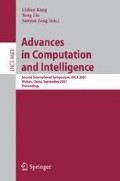Abstract
In this paper An Asynchronous Parallel Evolutionary Modeling Algorithm (APEMA) for automatically modeling of dynamic systems is proposed. The algorithm is based on a two –level hybrid evolutionary modeling algorithm HEMA].The APEMA is used to automatically discover knowledge modeled by higher order of ordinary differential equations from dynamic data by using different computing systems, especially, the MIMD computers. Two cases of modeling examples are used to demonstrate the potential of APEMA .One is for modeling the limit of the solutions of BUMP problem as its dimension n tending to infinity, another is for modeling the super-spreading events of severe acute respiratory syndrome (SORS) in Beijing, 2003.The results show that the dynamic models automatically discovered in data by computer sometimes can compare with the models discovered by human beings.
Access this chapter
Tax calculation will be finalised at checkout
Purchases are for personal use only
Preview
Unable to display preview. Download preview PDF.
References
Fayyad, U.M, Piatetsky-Shapiro, G., Smyth, P., Uthurusamy, R. (eds.): Advances in Knowledge Discovery and Data Mining. AAAI Press/The MIT Press (1966)
Iba, H., Sasaki, T.: Using genetic programming to predict financial data. In: Proceedings of the Congress on Evolutionary Computation, vol. 1, pp. 244–251 (July 6-9, 1999)
Hafner, C., Frohlich, J.: Generalized function analysis using hybrid evolutionary algorithms. In: Proceedings of the Congress on Evolutionary Computation, vol. 1, pp. 287–294 (July 6-9, 1999)
Yoshihara, I., Numata, M., Sugawara, K., Yamacla, S., Abe, K.: Time series prediction model building with BP-like parameter optimization. In: Proceedings of the Congress on Evolutionary Computation, vol. 1, pp. 295–301 (July 6-9, 1999)
Cao, H.Q., Kang, L.S., Michalewicz, Z., Chen, Y.P.: A Hybrid evolutionary modeling algorithm for stem of ordinary differential equations. In: Neural, Parallel & Scientific Computations, June 1998, vol. 6(2), pp. 171–188. Dynamic Publishers, Atlanta (1998)
Keane, A.J.: Experiences with optimizers in structural design. In: Parmee, I.C., Plymouth (eds.) Proc. of the Conf. on Adaptive Computing in Engineering Design and Control 94, pp. 14–27 (1994)
Liu, P.: Evolutionary Algorithms and Their Parallelization. Doctoral Dissertation, Wuhan University (2000)
Liang, W., Zhu, Z., Guo, J., Liu, Z., He, X., Zhou, W., et al.: Severe acute respiratory syndrome, Beijing (2003), Emerg Infect Dis 10, 25–31(2004)
Author information
Authors and Affiliations
Editor information
Rights and permissions
Copyright information
© 2007 Springer-Verlag Berlin Heidelberg
About this paper
Cite this paper
Li, Y., Kang, Z., Gao, H. (2007). Automatic Data Mining by Asynchronous Parallel Evolutionary Algorithms. In: Kang, L., Liu, Y., Zeng, S. (eds) Advances in Computation and Intelligence. ISICA 2007. Lecture Notes in Computer Science, vol 4683. Springer, Berlin, Heidelberg. https://doi.org/10.1007/978-3-540-74581-5_53
Download citation
DOI: https://doi.org/10.1007/978-3-540-74581-5_53
Publisher Name: Springer, Berlin, Heidelberg
Print ISBN: 978-3-540-74580-8
Online ISBN: 978-3-540-74581-5
eBook Packages: Computer ScienceComputer Science (R0)

